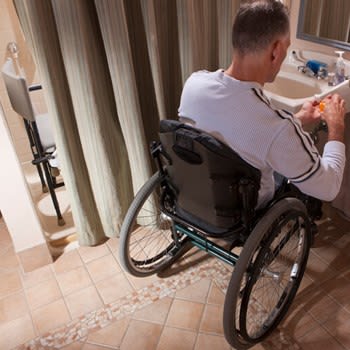Hiring a Home Health Aide: What to Know
- Find out how home health aides help older adults to age in place. Home health aides assist clients with daily tasks like grooming, bathing, eating and mobility.
Older adults who need assistance with day-to-day tasks are increasingly turning to professional caregivers to help them at home instead of moving into a nursing home or care facility. The desire to age in place and remain independent for as long as possible is fueling a demand for home health aides that's expected to increase 34% between 2019 and 2029.

Learn More About Medicare
Join our email series to receive your free Medicare guide and the latest information about Medicare.
By clicking "Sign me up!" you are agreeing to receive emails from HelpAdvisor.com
Thanks for signing up!
Your free Medicare guide is on the way.
Make sure to check your spam folder if you don't see it.
Why Are Home Health Aides in Demand?
Americans over the age of 65 are the fastest growing demographic in the United States. Older adults are not only living longer but also have up to four or more chronic conditions and illnesses that can make it difficult to care for themselves. It's estimated that by 2030, 28 million older adults in the United States will have activity limitations.
In-home health care helps people who don't need to be in a hospital or nursing home to safely live at home. While some of this support can be provided by health care professionals such as nurses and certified nursing assistants, most day-to-day care is often provided by:
- Home health aides
- Personal care aides
- Home or personal care attendants
What Does a Home Health Aide Do?
Home health aides visit clients in their homes to provide assistance with personal care, basic medical needs and household tasks. While caregivers aren't directly supervised while in the home, they typically report to a nurse, case manager or health practitioner. Depending on your particular needs, you may have a home health aide visit a few hours each day or remain all day on a long-term basis.
Home health aides have a variety of responsibilities depending on the requirements of their clients. Here are some of the most common activities they assist with and the percentage of clients needing this type of support, according to Statista.
- Bathing: 97%
- Walking: 95%
- Dressing: 92%
- Transferring to/from bed: 91%
- Toileting: 81%
- Eating: 61%
Health care aides can also assist with household tasks such as:
- Housekeeping
- Laundry
- Meal preparation
- Shopping
- Driving or transportation
Depending on state regulation, some home health aides may provide basic medical care.
- Checking pulse, temperature and other vital signs
- Assisting with medication
- Changing bandages
More complex medical tasks, such as administering treatments, monitoring infections, cleaning catheters, changing IVs and tube feeding, may require a certified nursing assistant or skilled nursing provider such as a Licensed Practical Nurse.
Home health aides are often an important source of companionship and socialization for older adults.
What Qualifications Do Home Health Aides Have?
Most home health aides have at least a high school diploma, although some complete a specialized program at a community college. According to Statista, 35% of home care workers have a high school degree and 20% have an associates' degree or higher.
Those who work with a certified home health agency must complete a formal training program and pass a competency test. Regulation can also vary by state, which may have minimum requirements for education and training, in addition to requiring background checks. Your state health board can provide more information about licensing or certifying home health aides.
Hiring a Home Health Aide
Home care agencies hire and train caregivers and place them with clients. Agencies that are eligible for Medicare payments must ensure their staff meets all regulations and minimum training requirements.
The National Association of Home Care and Hospice has an online database listing more than 33,000 agencies across the country to help you find a home care agency near you.
You can also hire a home health aide directly. Because in-home caregivers have different levels of experience, be sure to thoroughly vet their knowledge, dependability and trustworthiness.
How Much Does It Cost to Hire a Home Health Aide?
The cost of home health services depends on your needs, the qualifications of the home health aide, individual agencies and where you live. Some of the most expensive states for home health aide services include Washington, New Hampshire, Oregon, South Dakota, North Dakota and Massachusetts.
In some cases, you may be able to receive assistance through Medicare or a private insurance carrier for eligible in-home care services.



